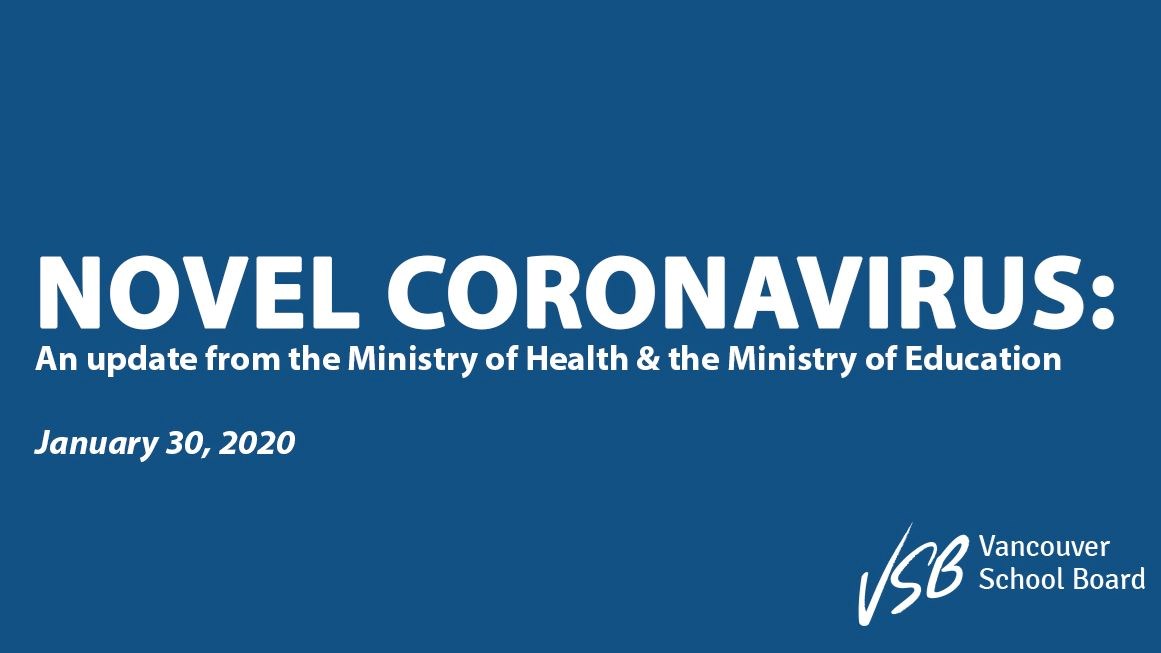Novel Coronavirus Update

The World Health Organization has declared the novel coronavirus a global health emergency; however, the B.C. Provincial Health Officer is advising that the risk is low within British Columbia and all necessary precautions are being taken to prevent the spread of infection.
Further details from the Ministry of Health and Ministry of Education are available here.
We understand our students, staff and parents/guardians may have questions about coronavirus. We can assure you that we are in regular communication with the Ministry of Education, Ministry of Health and our local health authority to make public health decisions, and to ensure students and employees are kept informed and safe. We will continue to be in close contact with public health officials and, with that in mind, would ask that you do not make assumptions about the risk of students or staff based on their ethnicity or travel history.
Please check out the HealthLinkBC website – there are some great questions and answers that you can direct your enquiries to - https://www.healthlinkbc.ca/health-feature/coronavirus
Advice for Students and Families Considering Travel:
Students and families considering travel to and from China are encouraged to consult the Novel Coronavirus in China Travel Health Notice on the Government of Canada Travel and Tourism page regularly, as recommendations may change over the course of your travel as new information becomes available. No matter where students and families plan to travel, the Public Health Agency of Canada recommends that they consult Government of Canada Travel and Tourism page, as this is the Government of Canada's official source of destination-specific travel information. This web page provides important advice to help travelers make informed decisions and travel safely while abroad. Students and their families should always tell their health care providers about their travel history if they become ill after returning to Canada.
Advice on masks from Provincial Health Officer, Dr. Bonnie Henry:
"The thing about masks is we know that they are very important in certain situations. If I'm sick, my wearing a mask keeps my droplets in. It does help prevent transmission to other people. That's why we ask somebody who's sick, who's going to an emergency department, for example, if you have a cough or respiratory symptoms, we ask you to put on a mask and clean your hands. Where it's not known is how effective wearing a mask in the community is when you are not sick yourself. The masks may give you a false sense of security. The most important thing that you can do in the community is to wash your hands regularly."
Reducing the risk
The BC Centre for Disease Control recommends that to reduce the risk of exposure to novel coronavirus, employ the same measures that are taken in relation to colds and flu:
Wash your hands frequently for at least 20 seconds using soap and hot water (it is the single most effective way of reducing infection spread).
Practice other good hygiene habits: do not touch your face/eyes/mouth with your hands, and cover your mouth and nose when you sneeze or cough (ideally with a disposable tissue or the crease of your elbow).
Clean and disinfect frequently touched workspace surfaces.
Maintain good general health (eat a balanced diet, get enough sleep, exercise in moderation).
Stay home if you are sick.
A new toll-free phone number (1-833-784-4397) has been established to answer questions from Canadians about the 2019 novel coronavirus. Service is available from 8 a.m. to 11 p.m. until January 29 and from 7 a.m. to midnight starting January 30 (Eastern Standard Time).
Further information about novel coronavirus is available on the BC Centre for Disease Control website.
Download a letter to families from Vancouver Coastal Health.
